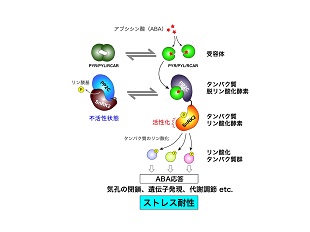植物の環境応答機構の解明とその応用

メンバー: 梅澤泰史
分野: 基礎生物学、ゲノム科学、境界農学
所属: 農学研究院生物システム応用科学府
キーワード: 植物、乾燥、耐塩性、アブシシン酸、シグナル伝達、プロテオーム
ウェブサイト:
研究概要

砂漠化や温暖化などの地球環境問題は、現代の科学技術が取り組むべき重要なテーマの一つです。我々は、植物科学研究の立場からこれらの問題にアプローチしています。植物が乾燥や塩などの環境ストレスに応答するメカニズムを分子レベルで明らかにするとともに、その知見を利用して干ばつや塩害等に強い作物の分子育種を目指します。特に植物の環境応答を司る植物ホルモンであるアブシジン酸(ABA)に着目し、タンパク質の翻訳後修飾(リン酸化など)によるシグナル制御機構を研究しています。さらに、植物の環境応答を調節する化合物を探索するため、ケミカルジェネティクス的手法も取り入れています。
①植物ホルモンアブシシン酸のシグナル伝達機構の解明
②植物のシグナル伝達に関わるリン酸化タンパク質の大規模解析(プロテオミクス)
③植物の環境ストレス耐性を高める化合物の探索(ケミカルスクリーニング)
主要論文・参考事項
1. Umezawa, T., Sugiyama, N., Takahashi, F., Anderson, J.C., Ishihama, Y., Peck, S.C. and Shinozaki, K. (2013) “Genetics and phosphoproteomics reveal a protein phosphorylation network in the abscisic acid pathway in Arabidopsis thaliana.” Sci. Signal. 6(270): rs8.
2. Schmutz, J., Cannon, S.B., Schlueter, J., Ma, J., Hyten, D., Song, Q., Mitros, T., Nelson, W., May, G.D., Gill, N., Peto, M., Goodstein, D., Thelen, J.J., Cheng, J., Sakurai, T., Umezawa, T., Shinozaki, K., Du, J., Bhattacharyya, M., Sandhu, D., Grant, D., Joshi, T., Libault, M., Zhang, X-.C., Xu, D., Futrell-Griggs, M., Abernathy, B., Hellsten, U., Berry, K., Grimwood, J., Wing, R.A., Cregan, P., Stacey, G., Specht, J., Rokhsar, D., Shoemaker, R.C. and Jackson, S.A. (2010) “Genome sequence of the paleopolyploid soybean (Glycine max (L.) Merr.)” Nature 463(7278): 178-183.
3. Umezawa, T., Sugiyama, Y., Mizoguchi, M., Hayashi, S., Myouga, F., Yamaguchi-Shinozaki, K., Ishihama, Y., Hirayama, T. and Shinozaki, K. (2009) “Type 2C protein phosphatases directly regulate abscisic acid-activated protein kinases in Arabidopsis.” Proc. Nat. Acad. Sci. USA. 106(41): 17588-17593.
4. Umezawa, T., Okamoto, M., Kushiro, T., Nambara, E., Oono, Y., Seki, M., Kobayashi. M., Kamiya, Y. and Shinozaki, K. (2006) “CYP707A3, a major ABA 8”-hydroxylase involved in dehydration and rehydration process in Arabidopsis thaliana.” Plant J. 46: 171-182.
5. Umezawa, T., Yoshida, R., Maruyama, K., Yamaguchi-Shinozaki, K. and Shinozaki, K. (2004)
“SRK2C, a SNF1-related protein kinase 2 that improves drought tolerance by controlling stress-responsive genes in Arabidopsis thaliana.” Proc. Nat. Acad. Sci. USA. 101(49): 17306-17311.
お問い合わせ先
東京農工大学・先端産学連携研究推進センター
urac[at]ml.tuat.ac.jp([at]を@に変換してください)
Molecular mechanisms of abiotic stress responses in plants

Research members: Dr. Taishi Umezawa
Research fields: Basic biology, Genome science, Boundary agriculture
Departments: Graduate School of Bio-Applications and Systems Engineering, Institute of Agriculture
Keywords: Arabidopsis, drought stress, abiotic stress, abscisic acid, signal transduction, protein phosphorylation, proteome
Web site:
Summary

Recent emerging global and environmental issues, such as desertification or global warming etc., has a great impact on agricultural production worldwide, because such environmental changes cause multiple abiotic stresses (drought, saliniy or temperature etc.) for plants. One of our major goal is to develop stress-tolerant crops/trees, through a series of biological studies on the molecular mechanisms of cellular signal transduction in responses to abiotic stress in plants. We are focusing on protein posttranslational modifications (e.g. phosphorylation) in signal transduction pathways. Recently we are trying to apply phosphoproteomics to investigate signal transduction networks in plants.
1) Signaling networks of abscisic acid responses in plants
2) Plant phosphoproteomics on signal transduction pathways
3) Chemical screening to control stress tolerance of plants
Reference articles and patents
1. Umezawa, T., Sugiyama, N., Takahashi, F., Anderson, J.C., Ishihama, Y., Peck, S.C. and Shinozaki, K. (2013) “Genetics and phosphoproteomics reveal a protein phosphorylation network in the abscisic acid pathway in Arabidopsis thaliana.” Sci. Signal. 6(270): rs8.
2. Schmutz, J., Cannon, S.B., Schlueter, J., Ma, J., Hyten, D., Song, Q., Mitros, T., Nelson, W., May, G.D., Gill, N., Peto, M., Goodstein, D., Thelen, J.J., Cheng, J., Sakurai, T., Umezawa, T., Shinozaki, K., Du, J., Bhattacharyya, M., Sandhu, D., Grant, D., Joshi, T., Libault, M., Zhang, X-.C., Xu, D., Futrell-Griggs, M., Abernathy, B., Hellsten, U., Berry, K., Grimwood, J., Wing, R.A., Cregan, P., Stacey, G., Specht, J., Rokhsar, D., Shoemaker, R.C. and Jackson, S.A. (2010) “Genome sequence of the paleopolyploid soybean (Glycine max (L.) Merr.)” Nature 463(7278): 178-183.
3. Umezawa, T., Sugiyama, Y., Mizoguchi, M., Hayashi, S., Myouga, F., Yamaguchi-Shinozaki, K., Ishihama, Y., Hirayama, T. and Shinozaki, K. (2009) “Type 2C protein phosphatases directly regulate abscisic acid-activated protein kinases in Arabidopsis.” Proc. Nat. Acad. Sci. USA. 106(41): 17588-17593.
4. Umezawa, T., Okamoto, M., Kushiro, T., Nambara, E., Oono, Y., Seki, M., Kobayashi. M., Kamiya, Y. and Shinozaki, K. (2006) “CYP707A3, a major ABA 8”-hydroxylase involved in dehydration and rehydration process in Arabidopsis thaliana.” Plant J. 46: 171-182.
5. Umezawa, T., Yoshida, R., Maruyama, K., Yamaguchi-Shinozaki, K. and Shinozaki, K. (2004)
“SRK2C, a SNF1-related protein kinase 2 that improves drought tolerance by controlling stress-responsive genes in Arabidopsis thaliana.” Proc. Nat. Acad. Sci. USA. 101(49): 17306-17311.
Contact
University Research Administration Center(URAC),
Tokyo University of Agriculture andTechnology
urac[at]ml.tuat.ac.jp
(Please replace [at] with @.)

